Emergency preparedness is a very vast topic and involves lots of things: from anticipating future disasters and taking preparatory/preventive measures to mitigation, response and recovery from disasters. I know, it sounds complicated, but my purpose in this article is to take a different approach to dealing with emergency preparedness. Just stick with me and you’ll see what I’m talking about.
1. General Emergency Preparedness
There are many types of emergencies, ranging from natural disasters (floods, hurricanes, earthquakes) to car accidents and plane crashes, i.e. man made ones (the most lethal of the bunch). I’m saying that because there are way more people killed in car crashes and by human error (generally) than in hurricanes or floods. For example, the average number of people killed in natural disasters in USA for the last 30 years is 399/year, while over 33.000 people die every year in car accidents alone.
Emergency Preparedness – Fire
- When entering a building familiarize yourself to “where you are” and be sure to know how to reach the two nearest EXITS;
- Hotels usually have fire escape stairs only to the first 6 floors; make room reservations accordingly;
- Smoke is blinding and will bank down in the rooms and hallways. This condition may force you to crouch or crawl to escape to safety;
- Use stairs, never take the elevator during a fire;
- If caught in smoke, drop to hands and knees and crawl towards the nearest exit. Hold your breath as much as possible; breathe through your nose and use a filter such as a shirt.
- If trapped in a room close as many doors as possible between you and the fire. Wet and place cloth material around or under the door to help prevent smoke from entering the room. If the room has an outside window, be prepared to signal to someone outside.
- If clothing caches fire: Stop, Drop and Roll!
More about fire emergency preparedness.
Emergency Preparedness – Floods
- Water—at least a 3-day supply; one gallon per person per day;
- Food—at least a 3-day supply of non-perishable, easy-to-prepare food
- Flashlight and extra batteries
- Battery-powered or hand-crank radio
- First Aid kit
- Cell phone
- Extra Cash
- Emergency blanket
- Extra clothing and rain gear
- When a flood or flash flood warning is issued for your area, head for higher ground and stay there;
- Stay away from flood-waters. If you come upon a flowing stream where water is above your ankles, stop, turn around and go another way. Six inches of swiftly moving water can sweep you off of your feet.
- If you come upon a flooded road while driving, turn around and go another way. If you are caught on a flooded road and waters are rising rapidly around you, get out of the car quickly and move to higher ground. Most cars can be swept away by less than two feet of moving water.
More about emergency preparedness – floods.
Emergency Preparedness – Earthquake
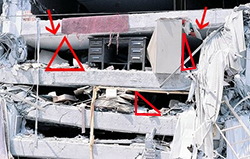 when entering a building become aware of all exits
when entering a building become aware of all exits- stay away from windows
- When the shaking starts find a close big, heavy, massive object to drop next to. This is called the Triangle of Life
- Make sure your home is securely anchored to its foundation.
- Hang heavy items, such as pictures and mirrors, away from beds
- Learn how to shut off the gas valves in your home and keep a wrench handy for that purpose
- Keep and maintain an emergency supplies kit in an easy-to-access location
- If you are in bed, drop next to it. Protect your head with a pillow.
- Don’t use the stairs; they are the first part of the building to collapse
More about emergency preparedness – earthquakes.
Emergency Preparedness – Winter Storm
- Winterize your vehicle and keep the gas tank full. A full tank will keep the fuel line from freezing
- Listen to local news channels for critical information on snow storms and blizzards
- Avoid driving when conditions include sleet, freezing rain or drizzle, snow or dense fog. If travel is necessary, keep a winter supplies kit in your vehicle.
- Go to a designated public shelter if your home loses power or heat during periods of extreme cold.
- Keep garage doors closed if there are water supply lines in the garage.
- Protect yourself from frostbite and hypothermia by wearing warm, loose-fitting, lightweight clothing in several layers. Stay indoors, if possible.
- If you stay in your car and it’s heavily snowing, check your exhaust pipe every hour. If it’s blocked by snow you can get poisoned by carbon monoxide
As I mentioned, “emergency preparedness” is a vast topic. Tips about emergency preparedness can be found in some of my articles like: Emergency Preparedness – Hurricanes, Drought and Food Crisis.
But, regardless the nature of the “disaster”, emergency preparedness should deal with the most important thing when it comes to survival: your mind. Fear is the mind killer and to conquer fear you must have confidence. Hence, acquiring the basic skills for survival will give you the balance and the wisdom when the moment comes.
2. Emergency Preparedness for SHTF Events
An SHTF situation is a much more severe disaster that effects a larger area. It’s a “ones in a 50 years event” that kills thousands to millions.
For example: the 1931 China floods (death toll: 3,500,000), the 1970 Bhola Cyclone (500,000 deaths), the 1976 Tangshan earthquake (600,000 killed), the 1999 mudslides in Vargas (30,000), the 1871 Wisconsin Peshtigo Fire (2,500).
Or even grater, like the 1346 Black Death (wiped out half of the population of Europe), the 1918 Flu Pandemic (75,000,000 deaths) or the Great Chinese Famine (death toll: 45,000,000).
Although, totally different events (floods, cyclone, earthquake, fire, virus, famine, etc), they all had common repercurssions:
- Looting and Violence (also common in less tragic events like Hurricane Katrina)
- Food Shortages and Famine
- Panic Buying (before or after the event)
- Diseases
Emergency preparedness for SHTF means, first of all, preparing for these 4 effects.
But this article is not meant to be about stockpiling. Of course you’ll need guns (to protect from looters), food, water and drugs supplies.
This article is about the things you should know, do or think when SHTF. One of the most important issue when it comes to emergency preparedness is the DECISIONS that you make!
What is essential is that you have the proper mind set and the necessary skills already acquired. Information is power and the survival skills that you mastered will make the difference. Being prepared mentally, physically and emotionally is equally important to “buying gear”.
Before starting spending your hard earned money on emergency preparedness, you should hit pause and think about what’s absolutely necessary for your survival in a given situation. Basically, what are you prepping for? And what is your bug out plan?
Bug Out Or Face The Music?
 If you live in the big city do you have the plan and the means to evacuate ASAP?
If you live in the big city do you have the plan and the means to evacuate ASAP?
If your intention is to bug out when SHTF, buying heavy survival gear and stockpiling food and water makes no sense, it’s a waste of time and money. You should focus on getting short term emergency supplies, bug out bags, stuff that will get you through in an emergency situation. You must concentrate on your bug out bag / bug out location and on your exit plan.
If you intend to stay and face the music, well, it’s the other way around. If you’re lucky enough to have a survival retreat/bug out location for you and your family, you should stockpile there, both in terms of survival gear and food/water. But don’t forget the escape plan! Remember the 3 G’s when it comes to emergency preparedness: gold, guns and a getaway plan!
The most important thing when it comes to prepping is to start doing it instead of dreaming about it.
Just get up from your couch and get things done, start learning now, while you still have time and you can benefit from the safety net offered by our (still) functioning society. Don’t wait until the last moment and keep in mind that prepping is a state of mind, a way of life, a work in progress. You can never stop and say: I’m done with it; you’ll always find ways to perfect yourself and your stash, you can always improve your gear and your skills.
Situational Awareness
The ultimate skill a prepper should achieve is situational awareness. This means that you must be aware at all times about what’s going on. You should train your mind and your eyes for identifying all the small details and constantly assess the potential threats and anticipate the people’s reactions in various situations. This will help you not only when SHTF but also in a car crash, a terrorist attack, an earthquake etc. All these situations have a common denominator: you trying to stay alive, using your brain and your skills.
Just to get an idea about what I’m talking about: the best way to win a violent confrontation is to avoid it. Hence, start practicing reading body language. You can begin with reading your co-workers reactions, i.e. how their posture, pitch of the voice or facial expressions change when they’re tired, excited, stressed, hungry, etc. You must study these aspects on people that you know because it’s easier. And they are generally true when trying to read people you don’t know.
Observe how people in love are reacting, but also watch people arguing, learn what the body language says about their state of mind, in good and bad situations. You must concentrate particularly over the eye’s movements and the movement of the skin around the eyes.
Education Is One Of The Best Investment One Can Make…
…especially when it comes to emergency preparedness. Knowledge is power, it can’t be stolen, nor left behind. And it will make the difference in a real survival scenario. There are moments when you may be separated from your gear/stockpile; but the skills you’ve acquired over time will allow you to find food and shelter even if you’re alone in the wild or in a violent city.
In order to achieve this goal, you should start preparing in advance, by carefully choosing the best books/prepping communities (online or offline), from which you’ll learn the basic survival skills that will allow you to stay alive in harsh times.
Along with absorbing information from books/internet, you should start your own garden, learn how to hunt and how to find fresh water.
When it comes to “Emergency Preparedness” (pandemic, fire, crashes, floods, hurricanes), the ultimate tool in your “stash” and the ultimate weapon in your paraphernalia is your mind. Stay alert, stay frosty, stay alive, never stop learning!
Watch this short video and learn a new trick that helped a few civilians in Gaza surviving an SHTF situation.

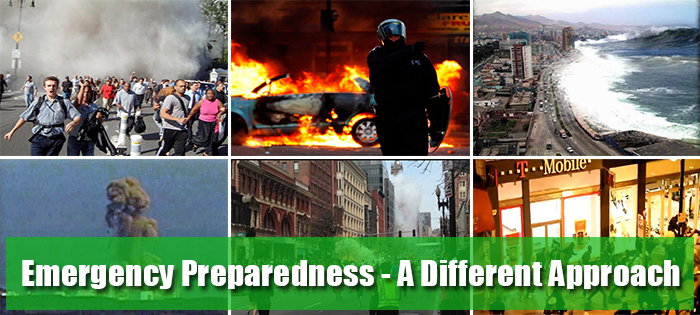
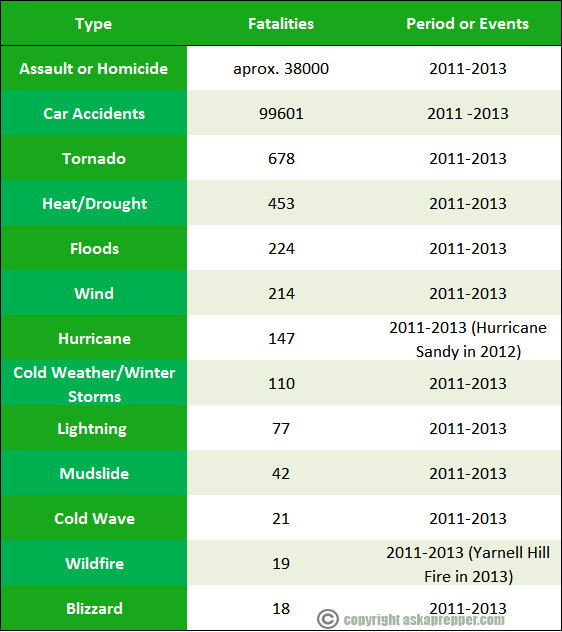








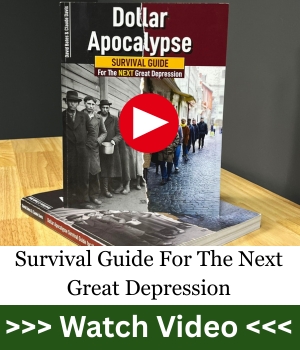



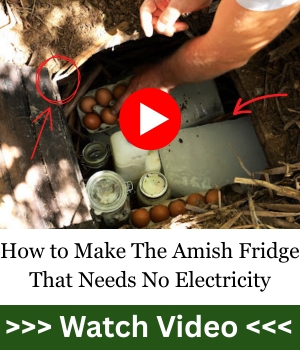

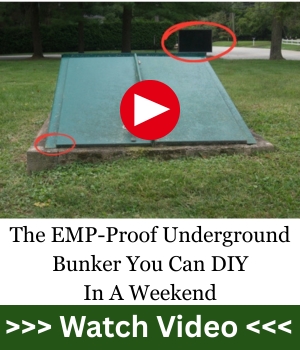






A great article to absorb before learning to prep. I’ve been prepping for over 30 yrs. could have saved a lot of time & money had I read this first. Thank you.
This makes so much sense to me I wish I had someone to talk to about my thoughts . I would like to know if I am on the right track.